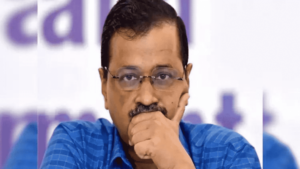Delhi Chief Minister Arvind Kejriwal submitted a response to the Directorate of Enforcement’s (ED) affidavit to the Supreme Court on Saturday, asserting that there is “no proof or material” indicating that the Aam Aadmi Party (AAP) received funds or illicit kickbacks from the South group, let alone utilized them during the Goa election campaign.
“Not a single Rupee was traced back to the AAP, and the allegations put forth in this regard are devoid of any tangible evidence, rendering them vague and baseless without any corroboration,” Kejriwal responded to the affidavit submitted by ED.
“No proof of even any cash payment was given. There exists no proof or material demonstrating that the AAP received funds or advanced kickbacks from the South group, let alone utilized them in the Goa election campaign. Not a single Rupee was traced back to the AAP, and the allegations put forth in this regard are devoid of any tangible evidence, rendering them vague, baseless without any corroboration,” as mentioned in the affidavit.
Arvind Kejriwal, the Chief Minister of Delhi, recently submitted an affidavit to the Supreme Court challenging the Enforcement Directorate’s (ED) stance on his arrest. He contended in his response that the central government was abusing its power to conduct arrests during the general election.
He argued that the timing of his arrest, occurring just before the announcement of the Lok Sabha election schedule and the implementation of the Model Code of Conduct, strongly indicates the “arbitrariness” of the ED.
“This timeline establishes the fact that Kejriwal has been arrested intentionally with a malafide intent without any necessity to arrest,” the Chief Minister responded.
The affidavit further stated that the ongoing “classic case” of how the ruling party-led central government has exploited the extensive powers of the Enforcement Directorate (ED) and the Prevention of Money Laundering Act (PMLA) to dismantle the Aam Aadmi Party and its leadership, which serves as its primary political adversary.
In his response, Kejriwal emphasized the absence of compelling evidence tying him to any criminal activities related to the underlying offense, such as the concealment, possession, acquisition, or utilization of proceeds of crime, which are necessary to invoke penalties under Section 3 of the Prevention of Money Laundering Act (PMLA).
The affidavit also asserted that on March 21, 2024, just five days after the declaration of the general elections and the enforcement of the Model Code of Conduct, the Enforcement Directorate (ED) unlawfully detained a sitting Chief Minister and the National Convenor of one of India’s six national Opposition parties.
Kejriwal noted that in the ongoing general elections, the AAP is directly challenging the ruling party at the Center, and highlighted that voting commenced on April 19.
The statement further indicated that Kejriwal’s unjust incarceration has significantly damaged his political party and will unjustly benefit the ruling party at the Center during a critical period of heightened political activity in the ongoing elections.
“A level playing field–which is a pre-requisite for ‘free and fair elections’- has been compromised with the illegal arrest of the Petitioner,” the affidavit stated.
He asserted that he has consistently cooperated with the investigation and cited several Supreme Court rulings stating that non-cooperation by an individual does not justify an arrest.
The Chief Minister’s declaration went on to state that ED linked the purported, “large-scale destruction of evidence” as a ground to arrest Kejriwal, however, it stated, “there is not even a single averment alleging the destruction of evidence of any kind by Kejriwal and hence the said ground is devoid of any merit.”
“Moreover, the respondent (ED), being devoid of any cogent reason, is now raising frivolous and fictitious grounds for justifying the illegal arrest of the Petitioner (Kejriwal),” said the rejoined.
Kejriwal had appealed to the Supreme Court to revoke his detention and remand by the ED regarding the excise policy matter. The apex court had already directed the central agency to provide its response to Kejriwal’s plea.
Arvind Kejriwal, the leader of the Aam Aadmi Party (AAP), had challenged a Delhi High Court decision that dismissed his objection to his ED arrest and remand regarding the excise policy matter.
In his appeal to the highest court, Kejriwal asserted that his detention following the announcement of the general elections was, “motivated by extraneous considerations.”
On April 9, the High Court dismissed his plea for release from custody and dismissed his allegation that the upcoming Lok Sabha elections were driven by political vendetta.
The High Court had indicated that Kejriwal’s failure to adhere to nine ED summonses issued over six months raised questions about his assertion of special privilege as Chief Minister, suggesting that his detention was a consequence of his non-cooperation.
Kejriwal was apprehended by the ED on March 21 as part of a money laundering probe related to alleged irregularities in the now-defunct Delhi excise policy for 2021-2022.













